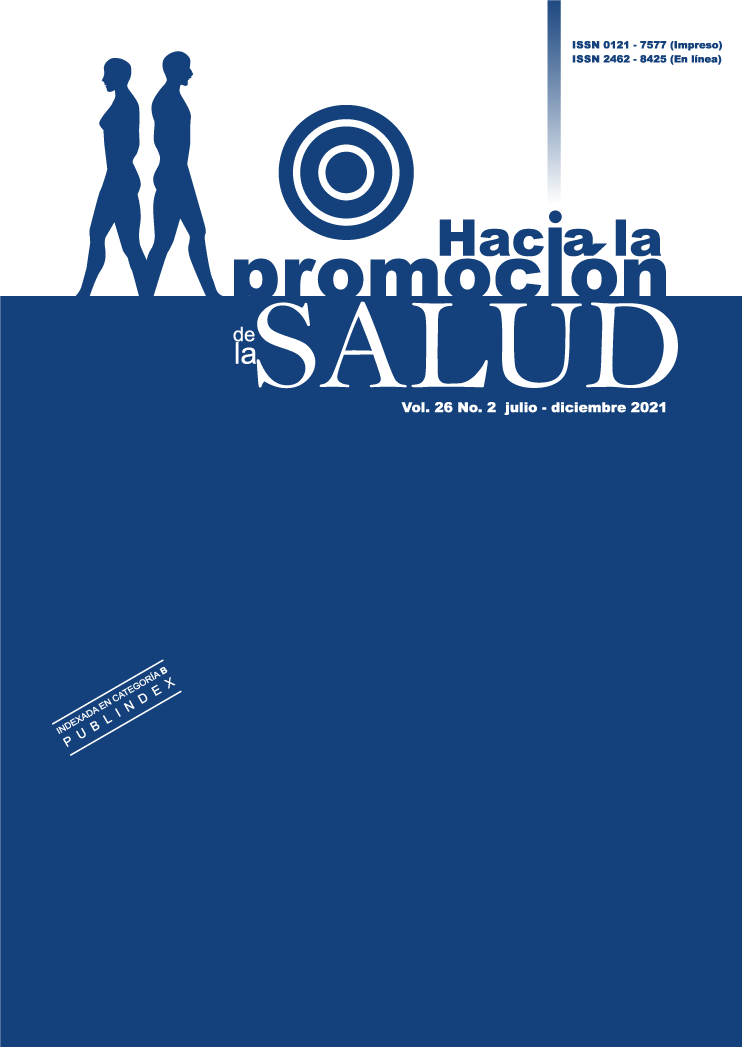Authors
Abstract
Obesity is a risk factor for different chronic diseases and is associated with genetic, environmental and social factors. Objective: To analyze the association between the social determinants of health and the prevalence of overweight and obesity in urban women, according to their socioeconomic status. Methods: This cross-sectional study used a mixed approach. For the quantitative component, structured interviews were conducted with a sample of women aged 25-45 years (n=137), representative of two urban cantons in Costa Rica. For the qualitative component, semi-structured interviews were conducted with a sample of 13 institutional actors of the same cantons. Results: There are inequalities in the prevalence of overweight and obesity, with a greater impact on the population with a low socioeconomic status. Citizen insecurity, socioeconomic status and overpopulation are obstacles to the development of healthy practices. There is a significant inverse association between regular physical activity and overweight and obesity (OR = 0.35, p = 0.03). Conclusions: These results are an input to carry out actions that promote equity, especially in populations that do not have resources for a healthy lifestyle.
References
2. Organización Mundial de la Salud. Obesidad y sobrepeso. [Online].; 2018. Available from: https://www.who.int/es/newsroom/fact-sheets/detail/obesity-and-overweight.
3. Organización de las Naciones Unidas para la Alimentación y la Agricultura y Organización Panamericana de la Salud. Panorama de la seguridad alimentaria y nutricional, América Latina y el Caribe: Sistemas alimentarios sostenibles para poner fin al hambre hambre y la malnutrició. FAO y OPS. 2017.
4. Urrejola P. ¿Porqué la obesidad es una enfermedad? Revista Chilena de Pediatría. 2007; 78(4).
5. Programa Estado de la Nación. Quinto Informe Estado de la Región en Desarrollo Humano Sostenible. San José: Costa Rica: Estado de la Nación; 2016.
6. Caja Costarricense de Seguro Social. Vigilancia de los factores de riesgo cardiovascular: Segunda encuesta 2014. Editorial Nacional de Salud y Seguridad Social EDNASSS. 2016.
7. Ministerio de Salud. Análsis de situación de salud. Memoria institucional. 2018.
8. Programa de las Naciones Unidas para el desarrollo y Universidad de Costa Rica. Ranking cantonal según Índice de Desarrollo Humano. 2016.
9. Bekelman T,Santamaría-Ulloa C,Dengo D. Using the protein leverage hypothesis to understand socioeconomic variation in obesity. American Journalof Human Biology. 2017; 29(3).
10. Instituto de Nutrición de Centro América y Panamá. Marco de referencia para el monitoreo y vigilancia de la obesidad en Centroamérica y República Dominicana. INCAP. 2016 Ciudad Guatemala, Guatemala.
11. Ministerio de Salud. Estrategia Nacional para el abordaje integral de las enfermedades crónicas no transmisibles y la obesidad 2013-2021. San José, Costa Rica. 2014 San José, Costa Rica.
12. Restrepo Sy Maya M. La familia y su papel en la formación de los hábitos alimentarios en el escolar. Un acercamiento a la cotidianidad. Universidad de Antioquia. 2005; 19(36).
13. Instituto Nacional de Salud Pública de México. Cuestionario sobre actividad física y sedentarismo para adultos entre 15 y 60 años. [Online]. Available from: https://ensanut.insp.mx/ensanut2016/Formatos%20de%20los%20cuestionarios%20con%20variables/D2_Actividad%20f%C3%ADsica_sedentarismo_15%20a%2069%20a%C3%B1os%20y%20horas%20de%20sue%C3%B1o.pdf.
14. González, M. Conocimientos, actitudes y prácticas sobre alimentación saludable y actividad física en el paciente obeso. [Online]. Available from: http://redi.ufasta.edu.ar:8080/xmlui/bitstream/handle/123456789/1304/2016_N_038.pdf?sequence=1.
15. Rojas-Barahona, C., Zegers, B. y Förster, C. -. La escala de autoestima de Rosenberg: Validación para Chile en una muestra de jóvenes adultos, adultos y adultos mayores. [Online].; 2009. Available from: https://scielo.conicyt.cl/scielo.php?script=sci_arttext&pid=S0034.
16. Organización Mundial de la Salud. [A Conceptual Framework for Action on the Social Determinants of Health].; 2010. Available from: http://apps.who.int/iris/bitstream/handle/10665/44489/9789241500852_eng.pdf?sequence=1.
17. Instituto Nacional de Estadística y Censos. [osta Rica Mapas de Pobreza 2011].; 2013 C.. Available from: http://www. inec.go.cr/sites/default/files/documentos/pobreza_y_presupuesto_de_hogares/pobreza/metodologias/documentos_metodologicos/mepobrezacenso2011-01.p.
18. Oliveira Lima-Filho D,Quevedo-Silva F,Gomes-Coelho ES y Rodrigues da Silva W. Criterios de selección y de consumo alimentarios en pequeñas ciudades de Brasil. 2016.
19. Organización Mundial de la Salud. Alimentos y bebidas ultra procesados en América Latina: tendencias, efecto sobre la obesidad e implicaciones para las políticas públicas. 2015.
20. Chacón-Tunjo N. Características socioculturales que orientan el consumo de comidas rápidas y comidas rápidas saludables en jóvenes universitarios de la ciudad de Bogotá. 2015.
21. Ministerio de Justicia y Paz. Política Local de Prevención de Violencia con enfoque de Género: Cantón de Alajuelita. 2015.
22. Ministerio de Justicia y Paz. Plan Local de Conviviencia y Seguridad Ciudadana Escazu. San Jose. Ministerio de Justicia y Paz. 2014.
23. Ministerio de Salud. Resolución 1083/2009. Apruébanse la Estrategia Nacional para la Prevención y Control de Enfermedades no Transmisibles y el Plan Nacional Argentina Saludable. San José, Costa Rica:; 2009.
24. Ministerio de Planificacion Nacional y Politica Economica. Indice de desarrollo social 2017. 2017.
25. AE Bojorge-Martínez. Los patrones de comunicación familiar y su impacto en la promoción de la dieta correcta y la activación física en la adolescencia.. Tlaquepaque, Jalisco: ITESO. 2016.
26. Organización Mundial de la Salud. Estrategia Mundial sobre el Régimen Alimentario, Actividad Física y Salud. Ginebra, Suiza. 2004.
27. Niñerola J,Capdevila L, Pintanel M. Barreras percibidas y actividad física: El autoinforme de barreras para la práctica de ejercicio físico. Revista Psicología del Deporte. 2006; 15(1).
28. Noriea A, Patel F, Werner D, Peek M. A Narrative Review of Physician Perspectives Regarding the Social. Current Diaebtes Reports. 2018.
29. Lima M. Desigualdades en Salud: Una perspectiva global. Ciencias de la Salud Colectiva. 2017. 30. Borrell C, Artazcoz L. Las políticas para disminuir las desigualdades en salud. Política de Salud y Salud Pública. 2008.
31. Schulter IT. Pormoción de la salud y la articulación con los determinantes sociales. Revista Hacia la Promoción de la Salud. 2020.


 pdf (Español (España))
pdf (Español (España))
 FLIP
FLIP



























